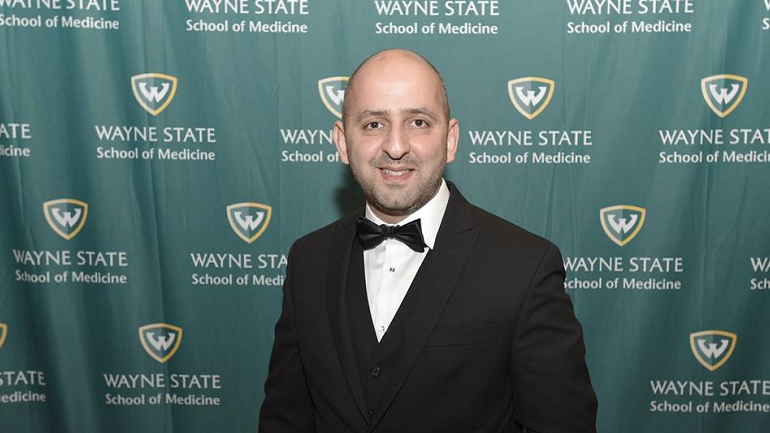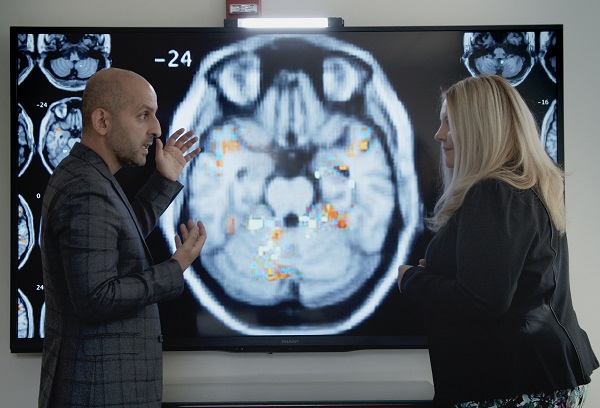
Wayne State University School of Medicine Associate Professor of Psychiatry and Behavioral Neurosciences Arash Javanbakht, M.D., will receive the Society of Biological Psychiatry’s 2023 Humanitarian Award for his demonstrated service and advocacy for mental illness.
The award recognizes the crucial contributions of those whose efforts have had a visible and public impact on the field of neurobiology and people suffering from mental illnesses.
“It was a reminder that we are doing important work at the STARC, work that touches people’s lives,” Dr. Javanbakht said.
STARC is the Stress, Trauma and Anxiety Research Clinic, founded seven years ago as part of the School of Medicine’s general psychiatry clinics. Dr. Javanbakht directs the clinic, located at Wayne State University’s Tolan Park Medical Building.

Dr. Javanbakht leads a team of STARC researchers on several projects, including a National Institute of Child and Human Development-funded longitudinal study of epigenetic, inflammatory, autonomic and environmental correlations of risk and resilience among Syrian and Iraqi refugees in the United States; the study of innovative body-based interventions for refugee children, including art and dance therapy; development of a cutting-edge patented technology using augmented reality for treatment of post-traumatic stress disorder and anxiety disorders; working with first responders across the state of Michigan in education, treatment and research; epigenetic studies of impact of high-intensity interval training on genetic aging and genetic aging among first responders; and collaboration with the state in educating schools on trauma-informed approaches in working with refugee children.
“Dr. Javanbakht is the ideal choice for this award. He is the consummate humanitarian,” said David Rosenberg, M.D., professor and chair of the Department of Psychiatry and Behavioral Neurosciences and The Miriam L. Hamburger Endowed Chair of Child Psychiatry. “It is in his DNA and continues to both motivate and inspire all of us, trainees and colleagues alike. We are fortunate that he is part of the WSU family.”
Dr. Javanbakht’s research has been featured on and in CNN, Aljazeera, National Public Radio, The Washington Post, Smithsonian, PBS, American Psychiatric Association Press Briefing, Anxiety and Depression Association of America, and the American Academy of Child and Adolescent Psychiatry, among others.
As a clinician, Dr. Javanbakht treats civilians with trauma exposure, refugees and survivors of torture and human trafficking, and first responders, all of which are sensitive and highly trauma-exposed populations, he added.
“We have been among the leaders of research and work with one of the most sensitive populations -- displaced populations and the refugees,” he said. “I started this project with all volunteer work of my team, refugee doctors and community organizations to determine the mental health impact of war exposure on adult and child refugees in the heat of the Syria civil war. I believe this has been very important work as there was no data of such kind available at the time in the U.S., and for that matter, very few in the European Union. This was specifically important, as the focus of health care screening and services at the time was on physical illnesses, ignoring the most common conditions: anxiety, depression and PTSD.”
For Dr. Javanbakht, being a humanitarian means “to have an ability for empathy for others, and being able to understand their needs and care for them. It is prioritizing what really matters over the common academic ambitions that usually distract us from the main goal. It is to focus on the real impact and what can really help others in their yearning for prosperity and health.”
The loss of his father a few years ago reminded him of his own mortality. “That helped me in deciding to prioritize ‘impact’ in what I do. I now seek the work, both clinical and research, that can really impact people’s lives, make them healthier and happier. That does not necessarily include only patients, it involves colleagues and mentees as well,” he said.
The award will be presented to Dr. Javanbakht at the society’s annual Scientific Convention and Meeting, set for April 27-29 in San Diego.
The Society of Biological Psychiatry was founded in 1945 to emphasize the medical and scientific study and treatment of mental disorders. Its purpose is to foster scientific research and education, and to raise the level of knowledge and comprehension in the field of psychiatry. It is the oldest neuropsychiatry research society in the U.S., with more than 1,500 members from across the U.S., Canada, Europe and Asia. Members conduct research in areas spanning from basic cellular studies to clinical trials and prevention research.